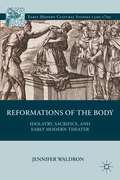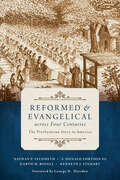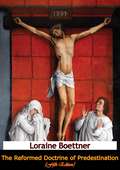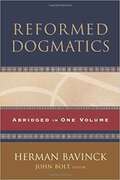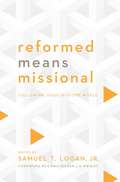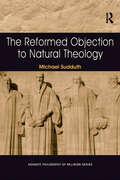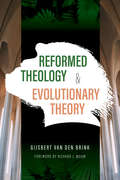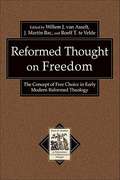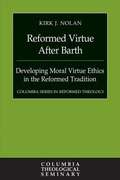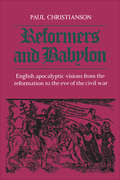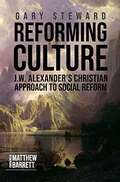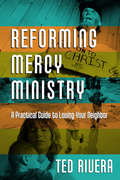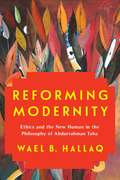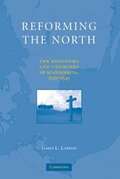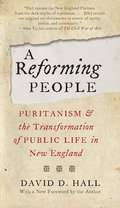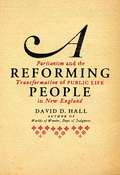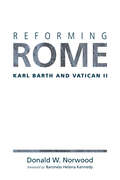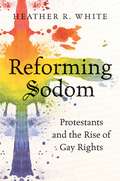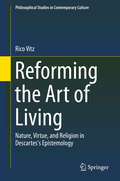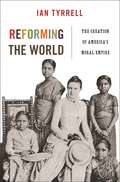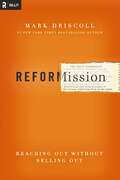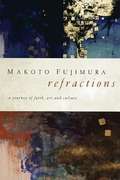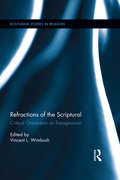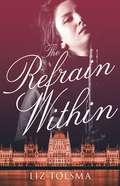- Table View
- List View
Reformation Unbound
by Karl Gunther"Fundamentally revising the understanding of the nature and intellectual contours of early English Protestantism, Karl Gunther argues that sixteenth- century English evangelicals were calling for reforms and envisioning godly life in ways that were far more radical than have hitherto been appreciated. Typically such ideas have been seen as later historical developments, associated especially with radical puritanism, but Gunther's work draws attention to their development in the earliest decades of the English Reformation. Along the way, the book offers new interpretations of central episodes in this period of England's history, such as the "Troubles at Frankfurt" under Mary and the Elizabethan vestments controversy. By shedding new light on early English Protestantism, the book ultimately casts the later development of puritanism in a new light, enabling us to re-situate it in a history of radical Protestant thought that reaches back to the beginnings of the English Reformation itself"--
Reformations Of The Body
by Jennifer WaldronThis project takes the human body and the bodily senses as joints that articulate new kinds of connections between church and theatre and overturns a longstanding notion about theatrical phenomenology in this period.
Reformed and Evangelical across Four Centuries: The Presbyterian Story in America
by Nathan Feldmeth S. Donald Fortson III Garth M. Rosell Kenneth J. StewartA definitive history of evangelical Presbyterianism in America Reformed and Evangelical across Four Centuries tells the story of the Presbyterian church in the United States, beginning with its British foundations and extending to its present-day expression in multiple American Presbyterian denominations. This account emphasizes the role of the evangelical movement in shaping various Presbyterian bodies in America, especially in the twentieth century amid increasing departures from traditional Calvinism, historic orthodoxy, and a focus on biblical authority. Particular attention is also given to crucial elements of diversity in the Presbyterian story, with increasing numbers of African American, Latino/a, and Korean American Presbyterians—among others—in the twenty-first century. Overall, this book will be a bountiful resource to anyone curious about what it means to be Presbyterian in the multidimensional American context, as well as to anyone looking to understand this piece of the larger history of Christianity in the United States.
The Reformed Doctrine of Predestination [Fifth Edition]
by Loraine BoettnerFirst published in 1941, this is the Fifth Edition of Loraine Boettner’s 1932 publication The Reformed Doctrine of Predestination and is widely considered to be one of the 20th-century’s most reasoned explanations of the sovereignty of God and the Reformed interpretation of salvation.“THE purpose of this book is not to set forth a new system of theological thought, but to give a restatement to that great system which is known as the Reformed Faith or Calvinism, and to show that this is beyond all doubt the teaching of the Bible and of reason.”—Loraine Boettner, Introduction“Whoever really wants to know what Calvinism teaches cannot do better than to read this book from cover to cover”.—United Presbyterian magazine
Reformed Dogmatics: Abridged in One Volume
by John Bolt Herman BavinckHerman Bavinck's four-volume Reformed Dogmatics is one of the most important theological works of the twentieth century. The recently completed English translation has received wide acclaim. <p><p> Now John Bolt, one of the world's leading experts on Bavinck and editor of Bavinck's four-volume set, has abridged the work in one volume, offering students, pastors, and lay readers an accessible summary of Bavinck's masterwork. This volume presents the core of Bavinck's thought and offers explanatory materials, making available to a wider audience some of the finest Dutch Reformed theology ever written.
Reformed Means Missional: Following Jesus into the World
by Samuel T. LoganChristians are not on a mission for God; his church is on his mission--the mission of bringing the grace of Christ to sinners; the mission of bringing the whole world into obedience to Christ; and the mission of filling the world with his fame and glory. Being on God's mission means following Jesus into the world, often an evil and frightening place. It is a place of idolatry, relativism, and secularism; it is a place where sexual abuse and child abuse occur; it is a place of pain and poverty and disease; it is a place of sexual dysfunction. But it was to this place that Jesus came, and we do him honor as we follow him into the world bringing the good news of the total redeeming work of Christ.Reformed Means Missional gathers Reformed leaders from all across the globe to demonstrate why and how the church must be on God's mission of bringing grace, holiness, compassion, and justice to a world of sin and suffering.
The Reformed Objection to Natural Theology (Routledge Philosophy of Religion Series)
by Michael SudduthMichael Sudduth examines three prominent objections to natural theology that have emerged in the Reformed streams of the Protestant theological tradition: objections from the immediacy of our knowledge of God, the noetic effects of sin, and the logic of theistic arguments. Distinguishing between the project of natural theology and particular models of natural theology, Sudduth argues that none of the main Reformed objections is successful as an objection to the project of natural theology itself. One particular model of natural theology - the dogmatic model - is best suited to handle Reformed concerns over natural theology. According to this model, rational theistic arguments represent the reflective reconstruction of the natural knowledge of God by the Christian in the context of dogmatic theology. Informed by both contemporary religious epistemology and the history of Protestant philosophical theology, Sudduth’'s examination illuminates the complex nature of the project of natural theology and its place in the Reformed tradition.
Reformed Theology and Evolutionary Theory
by Gijsbert Van den BrinkMany books aim to help beginners explore whether or not evolutionary science is compatible with Christian faith. This one probes more deeply to ask: What do we learn from modern evolutionary science about key issues that are of special theological concern? And what does Christian theology, especially in its Reformed expressions, say about those same key issues? Gijsbert van den Brink begins by describing the layers of meaning in the phrase &“evolutionary theory&” and exploring the question of how to interpret the Bible with regard to science. He then works through five key areas of potential conflict between evolutionary theory and Christian faith, spelling out scientific findings and analyzing Christian doctrinal concerns along the way. His conclusion: although some traditional doctrinal interpretations must be adjusted, evolutionary science is no obstacle to classical Christian faith.
Reformed Thought on Freedom: The Concept of Free Choice in Early Modern Reformed Theology
by J. Martin Bac Richard Muller Willem J. Van Asselt Roelf T. Te VeldeThis book makes a major contribution to historical scholarship on the problem of free choice and to contemporary debates over determinism and divine foreknowledge of future events. It fills a significant gap in Reformed knowledge by presenting sources in translation and commentary on works of major importance to the Protestant tradition that have been neglected for centuries. The book begins with an introductory discussion of free choice and the Reformed tradition and then moves on to examine the concept of freedom in the work of six early modern Reformers: Girolamo Zanchi, Franciscus Junius, Franciscus Gomarus, Gisbertus Voetius, Francesco Turrettini, and Bernardinus de Moor. It will be valued by all students of Reformed theology.
Reformed Virtue After Barth: Developing Moral Virtue Ethics in the Reformed Tradition
by Kirk J. NolanWith its focus on the traditions and communities that form us over the course of a lifetime, virtue ethics has richly expanded our understanding of what the Christian life can look like. Yet its emphasis on human virtues and habits of mind and life seems inconsistent with the Reformed tradition's insistence that sin lies at the heart of the human condition. For this reason, virtue ethics seems out of place in Reformed theology, especially in the company of the Reformed tradition's greatest twentieth-century theologian, Karl Barth. In this new addition to the Columbia Series in Reformed Theology, Kirk Nolan argues that Barth's theology actually proves virtue ethics can be compatible with the Reformed tradition. Rather than see virtue as an inevitable and natural process of growth, Barth helps us understand that development in the Christian life comes through a process of repetition and renewal, and that all virtue comes solely as a gift from God. Nolan establishes an important bridge between Reformed moral teaching and the tradition of virtue ethics.
Reformers and Babylon: English Apocalyptic Visions from the Reformation to the Eve of the Civil War
by Paul Kenneth ChristiansonStarting in the 1530s with John Bale, English reformers found in the apocalyptic mysteries of the Book of Revelation a framework for reinterpreting the history of Christianity and explaining the break from the Roman Catholic Church. Identifying the papacy with antichrist and the Roman Catholic Church with Babylon, they pictured the reformation as a departure from the false church that derived its jurisdiction from the devil. Those who took the initiative in throwing off the Roman yoke acted as instruments of God in the cosmic warfare against the power of evil that raged in the latter days of the world. The reformation ushered in the beginning of the end as prophesied by St. John.Reformers and Babylon examines the English apocalyptic tradition as developed in the works of religious thinkers both within and without the Established Church and distinguishes the various streams into which the tradition split. By the middle of Elizabeth's reign the mainstream apocalyptic interpretation was widely accepted within the Church of England. Under Charles I, however, it also provided a vocabulary of attack for critics of the Established Church. Using the same weapons that their ancestors had used to justify the reformation in the first place, reformers like John Bastwick, Henry Burton, William Prynne, and John Lilburne attacked the Church of England's growing sympathies with Romish ways and eventually prepared parliamentarians to take up arms against the royalist forces whom they saw as the forces of antichrist. Scholars of sixteenth- and seventeenth-century intellectual history will welcome this closely reasoned study of the background of religious dissent which underlay the politics of the time.
Reforming Culture: J. W. Alexander's Christian Approach To Social Reform
by Gary Steward Matthew BarrettHow should we address the social ills in our culture? How should we respond to the social and economic inequalities around us? James W. Alexander (1804-1859) thought deeply about these problems and wrote extensively about how these issues might be addressed from a Christian perspective. The son of Princeton Seminary's first faculty member, Alexander rose to prominence in the nineteenth century as a Christian leader in Virginia, New Jersey, and New York City. While he authored numerous books and articles, Alexander's contribution to evangelical thought has largely been overlooked. Alexander was deeply concerned about the economic, political, and social structures of antebellum American society, and he left behind a great deal of material that addressed these issues. In an age when social reformers traversed America with an abundance of novel ideas and utopian schemes, Alexander believed that the Christian gospel and the influence of Christian truth was the best means approach for bringing about lasting good in the world around us. Alexander's thoughts on government, economics, education, and race continue to be relevant for our own day. While the complexion of our social ills may have changed, the solution to needs of our culture have largely remained the same.
Reforming Mercy Ministry: A Practical Guide to Loving Your Neighbor
by Ted RiveraReforming Mercy Ministry
Reforming Modernity: Ethics and the New Human in the Philosophy of Abdurrahman Taha
by Wael HallaqReforming Modernity is a sweeping intellectual history and philosophical reflection built around the work of the Morocco-based philosopher Abdurrahman Taha, one of the most significant philosophers in the Islamic world since the colonial era. Wael B. Hallaq contends that Taha is at the forefront of forging a new, non-Western-centric philosophical tradition. He explores how Taha’s philosophical project sheds light on recent intellectual currents in the Islamic world and puts forth a formidable critique of Western and Islamic modernities.Hallaq argues that Taha’s project departs from—but leaves behind—the epistemological grounds in which most modern Muslim intellectuals have anchored their programs. Taha systematically rejects the modes of thought that have dominated the Muslim intellectual scene since the beginning of the twentieth century—nationalism, Marxism, secularism, political Islamism, and liberalism. Instead, he provides alternative ways of thinking, forcefully and virtuosically developing an ethical system with a view toward reforming existing modernities. Hallaq analyzes the ethical thread that runs throughout Taha’s oeuvre, illuminating how Taha weaves it into a discursive engagement with the central questions that plague modernity in both the West and the Muslim world. The first introduction to Taha’s ethical philosophy for Western audiences, Reforming Modernity presents his complex thought in an accessible way while engaging with it critically. Hallaq’s conversation with Taha’s work both proffers a cogent critique of modernity and points toward answers for its endemic and seemingly insoluble problems.
Reforming The North: The Kingdoms and Churches of Scandinavia, 1520-1545
by James L. LarsonThe turbulence of the Protestant Reformation marks a turning point in European history, but the Scandinavian contribution to this revolution is not well known outside the Northern world. Reforming the North focuses on twenty-five years (1520-1545 A.D.) of this history, during which Scandinavians terminated the medieval Union of Kalmar, toppled the Catholic Church, ended the commercial dominance of the German Hanse, and laid the foundations for centralized states on the ruins of old institutions and organizations. This book traces the chaotic and often violent transfer of resources and authority from the decentralized structures of medieval societies to the early modern states and their territorial churches. Religious reform is regarded as an essential element in the process - in the context of social unrest, political conflict, and long-term changes in finance, trade, and warfare. Reforming the North offers a broad perspective on this turbulent period and on the implications of the Protestant Reformation for Northern history.
A Reforming People
by David D. HallIn this revelatory account of the people who founded the New England colonies, historian David D. Hall compares the reforms they enacted with those attempted in England during the period of the English Revolution. Bringing with them a deep fear of arbitrary, unlimited authority, these settlers based their churches on the participation of laypeople and insisted on "consent" as a premise of all civil governance. Puritans also transformed civil and criminal law and the workings of courts with the intention of establishing equity. In this political and social history of the five New England colonies, Hall provides a masterful re-evaluation of the earliest moments of New England's history, revealing the colonists to be the most effective and daring reformers of their day.
A Reforming People: Puritanism And The Transformation Of Public Life In New England
by David D. HallA revelatory account of the aspirations and accomplishments of the people who founded the New England colonies, comparing the reforms they enacted with those attempted in England during the period of the English Revolution. Distinguished historian David D. Hall looks afresh at how the colonists set up churches, civil governments, and methods for distributing land. Bringing with them a deep fear of arbitrary, unlimited authority grounded in either church or state, these settlers based their churches on the participation of laypeople and insisted on "consent" as a premise of all civil governance. Encouraging broad participation and relying on the vigorous use of petitioning, they also transformed civil and criminal law and the workings of courts. The outcome was a civil society far less authoritarian and hierarchical than was customary in their age--indeed, a society so advanced that a few dared to describe it as "democratical." They were well ahead of their time in doing so.As Puritans, the colonists also hoped to exemplify a social ethics of equity, peace, and the common good. In a case study of a single town, Hall follows a minister as he encourages the townspeople to live up to these high standards in their politics. This is a book that challenges us to discard long-standing stereotypes of the Puritans as temperamentally authoritarian and their leadership as despotic. Hall demonstrates exactly the opposite. Here, we watch the colonists as they insist on aligning institutions and social practice with equity and liberty.A stunning re-evaluation of the earliest moments of New England's history, revealing the colonists to be the most effective and daring reformers of their day.From the Hardcover edition.
Reforming Rome: Karl Barth and Vatican II
by Donald W. NorwoodFew people realize that Karl Barth, one of the twentieth century’s greatest Protestant theologians, was among a select group of non-Catholic guests who were invited to the Second Vatican Council (1962–65) to assist in the reform and renewal of the Roman Catholic Church. In Reforming Rome Donald Norwood offers the first book-length study of Barth’s involvement with Vatican II and his significant impact on the reform of the Catholic Church.Norwood examines Barth’s critical engagement with the Roman Catholic Church from his time at the (Catholic) University of Munster to his connection with Vatican II, his conversations with Pope Paul VI, and seminars and interviews he gave about the Council afterward. On the basis of extensive research, Norwood amplifies Barth’s own very brief account of Vatican II.Barth himself often felt that he was better understood by Roman Catholics such as Hans Küng, Hans Urs von Balthasar, and Joseph Ratzinger than he was by his own Reformed colleagues. This study, written by a fellow Reformed theologian, helps us to see why.
Reforming Sodom
by Heather Rachelle WhiteWith a focus on mainline Protestants and gay rights activists in the twentieth century, Heather R. White challenges the usual picture of perennial adversaries with a new narrative about America's religious and sexual past. White argues that today's antigay Christian traditions originated in the 1920s when a group of liberal Protestants began to incorporate psychiatry and psychotherapy into Christian teaching. A new therapeutic orthodoxy, influenced by modern medicine, celebrated heterosexuality as God-given and advocated a compassionate "cure" for homosexuality.White traces the unanticipated consequences as the therapeutic model, gaining popularity after World War II, spurred mainline church leaders to take a critical stance toward rampant antihomosexual discrimination. By the 1960s, a vanguard of clergy began to advocate for homosexual rights. White highlights the continued importance of this religious support to the consolidating gay and lesbian movement. However, the ultimate irony of the therapeutic orthodoxy's legacy was its adoption, beginning in the 1970s, by the Christian Right, which embraced it as an age-old tradition to which Americans should return. On a broader level, White challenges the assumed secularization narrative in LGBT progress by recovering the forgotten history of liberal Protestants' role on both sides of the debates over orthodoxy and sexual identity.
Reforming the Art of Living
by Rico VitzDescartes's concern with the proper method of belief formation is evident in the titles of his works--e. g. , The Search after Truth, The Rules for the Direction of the Mind and The Discourse on Method of rightly conducting one's reason and seeking the truth in the sciences. It is most apparent, however, in his famous discussions, both in the Meditations and in the Principles, of one particularly noteworthy source of our doxastic errors--namely, the misuse of one's will. What is not widely recognized, let alone appreciated and understood, is the relationship between his concern with belief formation and his concern with virtue. In fact, few seem to realize that Descartes regards doxastic errors as moral errors and as sins both because such errors are intrinsically vicious and because they entail notably deleterious social consequences. Reforming the Art of Living seeks to rectify this rather common oversight in two ways. First, it aims to elucidate the nature of Descartes's account of virtuous belief formation. Second, it aims both (i) to illuminate the social significance of Descartes's philosophical program as it relates to the understanding and practice not of science, but of religion and (ii) to develop a kind of Leibnizian critique of this aspect of his program. More specifically, it aims to show that Descartes's project is "dangerous," insofar as it is subversive not only of traditional Christianity but also of other traditional forms of religion, both in theory and in practice.
Reforming the World: The Creation of America's Moral Empire (America in the World #4)
by Ian TyrrellReforming the World offers a sophisticated account of how and why, in the late nineteenth and early twentieth centuries, American missionaries and moral reformers undertook work abroad at an unprecedented rate and scale. Looking at various organizations such as the Young Men's Christian Association and the Student Volunteer Movement for Foreign Missions, Ian Tyrrell describes the influence that the export of American values had back home, and explores the methods and networks used by reformers to fashion a global and nonterritorial empire. He follows the transnational American response to internal pressures, the European colonies, and dynamic changes in global society. Examining the cultural context of American expansionism from the 1870s to the 1920s, Tyrrell provides a new interpretation of Christian and evangelical missionary work, and he addresses America's use of "soft power." He describes evangelical reform's influence on American colonial and diplomatic policy, emphasizes the limits of that impact, and documents the often idiosyncratic personal histories, aspirations, and cultural heritage of moral reformers such as Margaret and Mary Leitch, Louis Klopsch, Clara Barton, and Ida Wells. The book illustrates that moral reform influenced the United States as much as it did the colonial and quasi-colonial peoples Americans came in contact with, and shaped the architecture of American dealings with the larger world of empires through to the era of Woodrow Wilson. Investigating the wide-reaching and diverse influence of evangelical reform movements, Reforming the World establishes how transnational organizing played a vital role in America's political and economic expansion.
Reformission: Reaching Out without Selling Out
by Mark DriscollIf the unchurched in the United States ever formed their own country, it would be the world’s eleventh most populous nation. Reformission is a call to reform a flawed view of missions—as something we only do in foreign lands—to focus on the urgent needs in our own neighborhoods, filled with diverse Americans who desperately need the Gospel of Jesus and life in his Church. It calls for a movement of missionaries who seek the lost across the street, as well as across the globe. Many evangelical churches today are either hostile to the unbelieving world in which they live, or so friendly with the surrounding culture that they have lost the unique claims of the gospel that alone have the power to change people. This basic primer on the interface between gospel and culture by #1 New York Times bestselling author and pastor Mark Driscoll will help you to carefully navigate between the twin pitfalls of syncretism (being so culturally irrelevant that you lose your message) and sectarianism (being so culturally irrelevant that you lose your mission). If you’re more convinced today than ever that this crazy, sin-sick world needs a Savior, Reformission will show you how to love the Lord through the unchanging gospel, and love your neighbor in our ever-changing culture.
Refractions: A Journey Of Faith, Art, And Culture
by Makoto FujimuraA collection of essays, thoughts, and prayers from award-winning artist Makoto Fujimura, Refractions brings people of all backgrounds together in conversation and meditation on culture, art, and humanity.
Refractions of the Scriptural: Critical Orientation as Transgression (Routledge Studies in Religion)
by Vincent L. WimbushRefractions of the Scriptural is a transdisciplinary collection of essays that seeks to construct a new field of scholarly inquiry with scriptures as a fraught category, analytical wedge, and site for excavation and problematization. The book focuses on the ways in which individual and social bodies manipulate—and are manipulated by— the politics and power encoded in language and formalized canonical knowledge. Scriptures, in this sense, function as complex phenomena that are instrumental to social conservatism as well as social critique and social change. The essays in this volume, written by established and up-and-coming scholars across a wide range of disciplines, seek to locate, engage, and interpret the ways in which the scriptural shapes and reshapes people and the dynamics of identity formation. The chapters are organized around four domains or types of inquiry: the cognitive, the conscientized, the inscriptive, and the formative. It will be of interest to scholars of religion, as well as those interested more broadly in critical social and historical studies.
The Refrain Within (Music of Hope #3)
by Liz TolsmaTo save a life, would you betray everyone you love?Hungary in 1944 is a dark place. The Nazis have invaded and turned the country upside down, their evil making its way into every life.Clarinetist Eva Bognar is engaged to conductor and composer Patrik Kedves, happily planning her wedding. At first she doesn’t think the war will affect her directly; everyone around her can be trusted to do the right thing. Then her Jewish best friend and sister-in-law Zofia goes missing--and instead of the Gestapo being to blame, a friend says it was Patrik who led Zofia away. Has he betrayed Eva and everything the family stands for?When the rest of the family’s lives are directly threatened, Patrik’s secrets must come to light. The Bognars flee for the border in hopes of getting out of the country to the safety of Palestine. Eva must put her life and the lives of everyone she loves in the hands of the very man who betrayed her--and they may not all make it out of the war alive . . .

